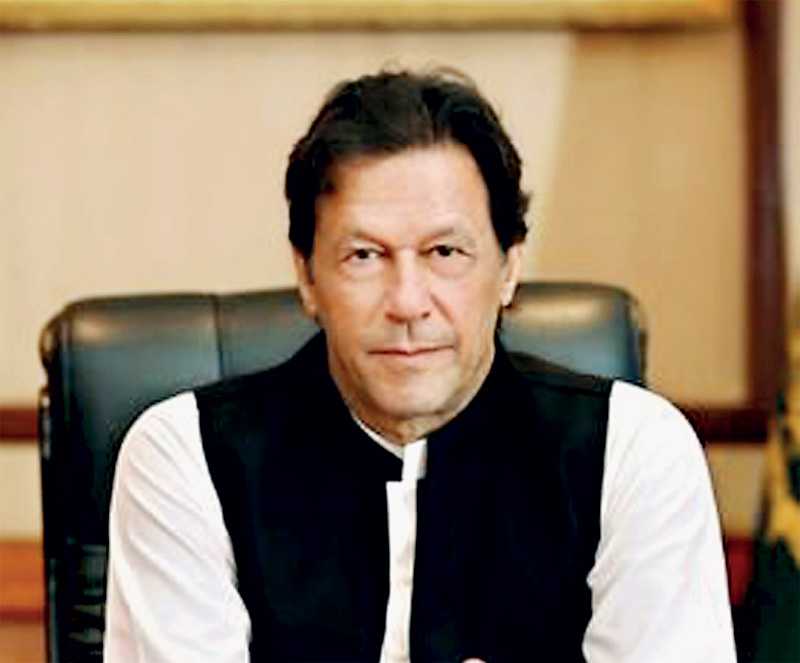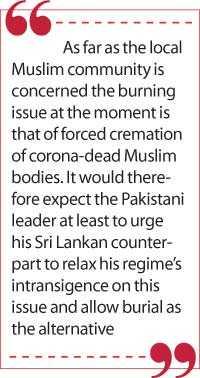Monday Feb 16, 2026
Monday Feb 16, 2026
Thursday, 11 February 2021 00:10 - - {{hitsCtrl.values.hits}}

Prime Minister of Pakistan Imran Khan
Ethnic-based politics is being used to exhort people, to serve own ends; this is anathema to nationalism
– Imran Khan –
 Cricket fame Prime Minister of Pakistan Imran Khan is expected to arrive on a State visit to Sri Lanka on 23 February.
Cricket fame Prime Minister of Pakistan Imran Khan is expected to arrive on a State visit to Sri Lanka on 23 February.
As always, the arrival of any Muslim Head of State from abroad is an occasion to celebrate for Sri Lankan Muslims, not because those leaders would help advance the status of the community materially or otherwise, but because of a feeling of belonging to a universal Islamic community or umma. This is something unique to Islam, which others may find difficult to understand.
Such a feeling of togetherness and enjoyment reached a climax in 1976 when a galaxy of Muslim heads of states arrived in Colombo for the Non-Aligned Conference. It was the greatest show on earth for Sri Lanka and its Muslim community. In keeping with this tradition, one would expect Muslims of Sri Lanka to welcome the Pakistani leader and discuss with him issues currently facing the community.
Unlike with other Muslim countries, there is a romantic attachment towards Pakistan at least among the educated elite of Sri Lankan Muslims. This attachment goes back to the very origins of Pakistan, when an intellectually and emotionally awakened Muslim intelligentsia became emotionally attracted to the idea of Pakistan as advocated by its philosopher poet Muhammad Iqbal.
For example, educationists like A. M. A. Azeez, community leaders like Razik Fareed, and poets and writers like Abdul Cader Lebbe were in the forefront of campaigning locally the idea of Pakistan, and they became staunch admirers of its leader Muhammad Ali Jinnah. They were captivated by the brilliance of Jinnah’s political and Iqbal’s philosophic case for Pakistan. In fact, a couple of poems written by Lebbe in Tamil and in support of Pakistan were censored in Madras at that time. 
Also, it was A. M. A. Azeez and Lebbe, who were instrumental in introducing the reformist thoughts on Islam by Iqbal. Pakistsan in their view, represented the only hope to take the world of Islam to its past glory after the demise of the Ottoman Empire. They suffered their greatest shock when Jinnah passed away on 11 September 1948.
I still remember as a school kid, how on that sad day, Kattankudy, the most conservative Muslim township, was turned into a sea of black flags. Even today Iqbal Day is celebrated by Muslim scholars and writers in many parts of Sri Lanka.
However, the Pakistan which those early leaders and intellectuals dreamt of was not the Pakistan of Imran Khan today. Let alone leading the Muslim world and restoring the past glory of Islam, Pakistan is not in a position even to rescue its own people from oceans of poverty, illiteracy and insecurity.
Having lost its Eastern wing to Bangladesh, the country is struggling to hold the rest of its territory from splitting apart. Corruption and nepotism are endemic and Prime Minister Khan, though not a religious fanatic himself, is always under the threat of being thrown out by religious bigots acting in collusion with fanatical elements in the military. The country is riven by religious factionalism and sectarian violence. The military is no doubt controlling the government. Imran Khan is walking on a tight rope.
Economically, the country is virtually bankrupt like Sri Lanka with a total public debt in August 2020 amounting to $ 270 billion, which is 106.8% of its GDP. Like Sri Lanka, Pakistan is also under China’s economic clout with its $ 62 billion China-Pakistan Economic Corridor and another $ 6.8 billion railway renovation plan. This economic nexus with China has obviously kept an outspoken Imran Khan silent on China’s treatment of Uyghur Muslims, just as the same nexus has prevented the Rajapaksa regime to be critical of China’s treatment of Tibetan Buddhists.
Be that as it may, the timing of Imran Khan’s visit is critical, especially at a time when Sri Lanka’s relations with India, Pakistan’s arch enemy, has hit the rocks. Soon after Sri Lanka’s volte face on the trilateral deal to develop the East Container Terminal with India’s Adani Group and Japan, the Sri Lankan Cabinet has agreed to allow China develop three renewal energy projects on the islands of Delft, Analaitivu and Nainativu, which are only 48 km away from Rameswaram in Tamil Nadu. 
The presence of China so close to India obviously raises security concerns, and is considered by India as provocative. India’s displeasure at these developments was shown when it refused to roll over the $ 400 million currency swap deal with Sri Lanka’s Central Bank for another three months, without Sri Lanka’s successful staff level agreement with IMF Program, which it does not have.
On top of these difficulties comes the UNHCR’s damning report on Sri Lanka’s human rights record, which is scheduled to be taken up for debate at UNHCR Council in Geneva in March. It is in this context that Imran Khan’s visit receives crucial importance. There is a strong possibility that President NGR and Prime Minister MR would not only canvass for the support of Pakistan in Geneva, but more than that, they would be pleading with him to canvass on their behalf the support of Arab and Muslim countries.
Given the composition of the council, if Muslim countries, along with Russia and China, could vote against the report, Sri Lanka could get away from an embarrassing confrontation with Western powers and their allies. Whether Imran Khan is that influential among Arab leaders is yet to be tested. After all, he is an ajam or non-Arabic speaker who is not at par with an Arab. Besides, what will Pakistan get from Sri Lanka in return for this dirty work is also unclear. In any case India’s R&AW will be secretly watching these moves and recommend countermoves to its authorities in New Delhi.
As far as the local Muslim community is concerned the burning issue at the moment is that of forced cremation of corona-dead Muslim bodies. It would therefore expect the Pakistani leader at least to urge his Sri Lankan counterpart to relax his regime’s intransigence on this issue and allow burial as the alternative.
Khan has already expressed his views against cremation and whether he could do anything more is doubtful. In all probability, the status quo would continue, because NGR’s and MR’s political survival depends on enforcing cremation on grounds of one-law-one-country principle, as insisted by hardline Buddhist supremacists. Given the corona-provoked restrictions, it is also doubtful whether local Muslim leaders would even have an opportunity to meet the Pakistani guest.
Muslims of Sri Lanka may well be advised not to build too much hope on the Pakistani leader. In fact, they should not and cannot expect much from Muslim heads of states of other countries, because those leaders would be acting purely in their own national interest. This is true of any country.
There is no practical substance in the concept of umma. It is a vacuous concept. Just as the Muslim nations have given up on Palestinians, Uighurs and Rohingyas, they will also give up on Sri Lankan Muslims, if the community builds any hope on their support.
Alternatively, the community should find solutions to its problems internally by joining hands with a coalition of progressive forces that are operating currently. Any outside pressure on the regime is obviously a welcoming bonus.
Hopefully, opposition to the Rajapaksa regime is growing both from within and outside the regime, and Muslims should join that opposition and bring about a regime change for a more democratic, prosperous and inclusive Sri Lanka.
(The writer is attached to the School of Business and Governance, Murdoch University, Western Australia.)